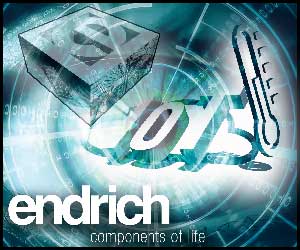Taking Medical Engineering Forward with Raspberry Pi
Megjelent: 2020. január 16.
 Yesterday’s students are today’s engineers and they love the Raspberry Pi 3
Yesterday’s students are today’s engineers and they love the Raspberry Pi 3
For some years, medical engineering specialist Kontron Austria Electronics (formerly exceet electronics) has been using the Raspberry Pi to enable its customers – major medical equipment OEMs – to develop market-leading medical devices. Kontron Austria Electronics is leading the way in medical electronics and their interface with the Internet of Things (IoT) while delivering on connectivity, security, scalability and sustainability. Working closely with its customers, the company helps them to add value to patient care while cutting the cost of that care. This article looks at why Kontron Austria Electronics chose to offer solutions based on Raspberry Pi and how its customers have benefited from this approach.
Based in Augsburg, Germany, and with branches all over the world, Kontron (where Kontron Austria Electronics belongs) – as a part of the technology group S&T – has forged a reputation around the world as a leader in embedded computing technology (ECT). In particular, whether through secure hardware, middleware or Internet of Things (IoT) services, Kontron has been meeting the needs of OEMs in various industries by offering a combination of standard products and tailor-made solutions based on highly reliable state-of-the-art embedded technologies.
In addition to a wide range of products based on X86 processor architectures from Intel and AMD as well as ARM-based processor architectures from NXP and ST Microelectronics, Kontron now complements the portfolio with the Raspberry Pi based products from Kontron Austria Electronics to address new types of customers and applications. This means that customers who want to produce functional prototypes or invest in building software on the standard Raspbian operating system (OS) can do so, but with access to many powerful features that are harder to implement on something like Yocto or via Linux.
The driving force behind Kontron’s approach has been the desire to offer customers such competitive advantages as accelerated time-to-market, reduced total cost of ownership and product longevity, as well as fully integrated applications. One of the main reasons that OEMs have been turning to Kontron, and staying with them as long-term product and solution development partners, is that the company is able to offer application-ready platforms which allow them to create sustainable and viable embedded/IoT solutions within short timeframes.
One of the key elements of the Kontron Austria Electronics offering for OEMs, who are looking to develop cutting-edge medical devices, has been to base its solutions around the Raspberry Pi from Farnell. As well as reduced time-to-market, and therefore shorter development cycles, major attractions of the Raspberry Pi for Kontron include its long-term availability and the huge amount of support available through a world-wide community dedicated to the platform.
Kontron Austria Electronics can therefore ensure long-term availability of equipment through extended product lifecycle management, as well as high reliability and quality assurance, tailor-made solutions optimised for individual applications, easy access to the latest technology, and reduced research and development costs through value-adding hardware and software services.

Why the Raspberry Pi?
So why did Kontron Austria Electronics choose the Raspberry Pi starter kit as one possible base for its medical solutions? What does the kit give to Kontron Austria Electronics in its offering to OEMs that other platforms just cannot deliver?
Kontron Austria Electronics currently operates in both industrial (60 percent) and medical (40 percent) markets. In its 32 years specialising in the design, development and manufacture of electronics products for use in countries around the world, it has worked with many different packages and solutions based around classic embedded systems. This includes designing hardware with Kontron’s own CPUs based on the ARM Cortex-M3 and M4 processors, I.MX 6 processors and Cortex-A8 and A9 application processors.
However, the Raspberry Pi is a platform that more and more customers have been requesting. Customers have approached Kontron Austria Electronics with functional prototypes of their solutions based on the Raspberry Pi Compute Module 3 with no wish to migrate to another platform for production. Recognising the popularity of the single-board computer among a new generation that has been brought up using it as a development kit, Kontron Austria Electronics chose to add the Raspberry Pi to its own offering, complementing the company’s existing range of other boards and products.
Designing-in the Raspberry Pi Compute Module and remaining on it for production enables Kontron customers to move their products forward seamlessly without having to make significant changes to the software. At the same time, due to the strict form factor required for equipment for medical use, the Raspberry Pi Compute Module 3 and 3+ are far more suitable for the medical instrument sector than the original Raspberry Pi 3.
The first Raspberry Pi computer was created to help students going to university to study computer science to build an understanding and familiarity with hardware. Compared with other platforms, the Raspberry Pi is especially highly valued across universities and technical high schools around the world. This has led to more and more engineers leaving education familiar with the Raspberry Pi and its advantages and wanting to put them to use in their chosen sector. These young engineers are now working for companies approaching Kontron for product support and are naturally turning to the Raspberry Pi when building their prototype. There is symmetry to the fact that the Raspberry Pi Foundation brought the Raspberry Pi to students and now these students, qualified and working in professional roles, are in turn bringing the Raspberry Pi to technical applications in a range of industries.
The biggest single benefit of using the Raspberry Pi in professional applications is that the ratio between price and CPU power is far better than that offered by many other platforms. Another feature of the Raspberry Pi that makes it ideal for use in medical products (as well as industrial products) is that the Raspberry Pi Compute Module offers excellent EMC compatibility, which is vitally important for medical products that are being used in critical environments.
One medical-based product that was developed by Kontron Austria Electronics recently using the Raspberry Pi Compute Module 3 is a Bluetooth gateway for laboratory applications. Using Bluetooth sensors, this unit collects data of samples going through a laboratory for analysis and processes this data for use in the kind of documentation that is needed in modern laboratories. Features of this product – which records parameters that samples produce such as humidity, UV and temperature – include a USB-C port and a LAN port plus two standard USB ports, a wireless LAN ac and two Bluetooth 5.0 ports.

Cubile health monitoring system
However, perhaps the best example of a market-leading product that has been developed with the Raspberry Pi Compute Module 3 is the Cubile continuous patient monitoring system which has full Class 2b medical certification.
Using Ballistocardiography, the Cubile collects health data, such as breathing and heart rates, as well as ‘bed exit’ data that helps to prevent falls and pressure sore injuries. All data is acquired using an in-bed sensor pad and the information is transmitted to a range of mobile devices or a PC. Continuous heart and breath rate monitoring helps to detect pain, fever or sleep disorders while the unit also detects bed wetness which is alerted through an instant alarm. Add-ons introduced in 2019 enable the monitoring system to handle renal monitoring, incontinence and automatic documentation.
Through its powerful CPU and extensive range of integrated features, the Cubile creates what is essentially a smart hospital bed which supports healthcare workers while providing a safe environment for patients, reducing anxiety and stress while at the same time optimising the use of costly resources. The unobtrusive unit saves time, increases safety, maximises personal freedom and protects privacy. According to its manufacturer CubileHealth, the sophisticated monitoring system “supports medical staff, detects health risks in a timely manner and helps to ensure the optimum quality of care". It does this by detecting dangerous situations before they occur and transferring notifications to a nurse call system integrated into the Compute Module 3.
Thanks to the Raspberry Pi Compute Module, extra features available on the Cubile unit include a second CPU for data acquisition, a LAN isolated with 4kV, an ultra-fast USB load cell interface, wireless LAN and Bluetooth capabilities, and a built-in battery with charger.
Long-term availability
As mentioned earlier, a major consideration of many of Kontron Electronic’s OEMs is long-term availability of the platform being used. This is because some of the medical engineering products that they offer have working lifetimes of between 10 and 15 years. While the Compute Module 3 has a guaranteed lifetime of five years, the Compute Module 3+ offers a lifespan of up to seven years, meaning that customers can be confident that they can purchase the Compute Module 3+ until at least 2026 for use in their products. Kontron Austria Electronics also operates a substantial storage facility filled with nitrogen to enable components to be kept in stock for periods of up to seven years without ageing, making it easier for customers to plan and implement their migration path.
All the solutions that Kontron Austria Electronics offers its customers to produce market-leading medical devices are customised to specific requirements depending on the end use of the product. For carrying out the initial test for example, Kontron Austria Electronics, with support from Farnell, offers the Raspberry Pi Compute Module 3 industrial starter kit which has more additional interfaces on it than would normally be available. These include analog/digital input and output ports, a second 10/100Mbit Ethernet port, a 24V power supply, a CAN-Bus bus standard, a one-wire interface, RS485/RS232 serial device connections and the Raspian OS with driver and Demos pre-installed.
With all these extra features, customers can have a functional prototype up and running rapidly using the same software as on a standard Compute Module 3 but with the added ability to customise to provide whatever capability the customer is looking for.
While Kontron has developed several off-the-shelf boards with standard interfaces that can be ordered out of a catalogue to meet the demands of the burgeoning Internet of Things (IoT) market, the vast majority of the projects it has worked on have been based around customised products. With Kontron Austria Electronics acting initially as a consultant and then as a designer or developer, customers come to the company with a specific request and Kontron Austria Electronics engineers provide their input and advice on what would be the optimal solution. This partnership has proved to be highly effective and has seen OEMs benefiting from extremely powerful solutions at the top of the price scale to lower-end products.

The future
Many of Kontron Austria Electronics’ medical engineering customers specify the Raspberry Pi Compute Module platform because they require a straightforward migration path for their equipment. The Raspberry Pi fulfils this criterion, offering a software compatible system that works efficiently and satisfies all the applicable certifications in the medical equipment environment. In addition, the Compute Module 3/3+ offers what is widely acknowledged as one of the best price versus CPU performance ratios on the market while presenting a viable, long-term solution that meets the needs of an ever-demanding sector.
While the future use of the Raspberry Pi in medical electronics applications is expected to grow at a steady pace, the increase is unlikely to be dramatic, because the platform has established itself firmly in this sector. However, over the next 12 months, Kontron’s experience suggests that there is likely to be an increase in the Compute Module 3 and Compute Module 3+ being used in more industrial applications where the Compute Module is proving itself to be an extremely versatile and powerful alternative.
There is a growing number of engineers educated with the Raspberry Pi platform. While most current engineering graduates will have some experience of CPUs from the likes of Intel, AMD or NXP, the majority will have worked on various projects with the Raspberry Pi and this means that when they start to work on a new project they will more than likely start with the Compute Module 3 or 3+. The platform works, they are familiar with it, they know its capabilities and they will want to stay with a solution that they trust and know how to use.
Indeed, it’s no exaggeration to say that in 2019 most engineers looking to develop prototypes, whether in the medical electronics or industrial sectors, will have had positive experiences with the Raspberry Pi and this will be the driving force behind the product being more widely used for the foreseeable future.
Kontron believes that the Raspberry Pi will continue to meet the company’s product development needs for many years to come and is looking forward to changes in the market – including the Compute Module 3 and 3+ being produced in higher volumes and the possible launch of the Raspberry Pi Compute Module 4.
By Michael Starker, Marketing Manager DACH, Farnell


















